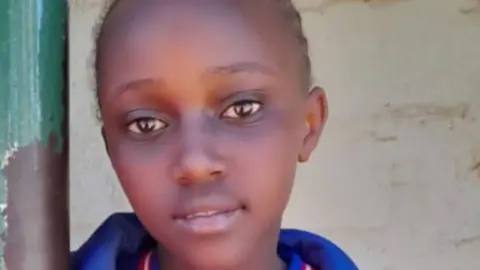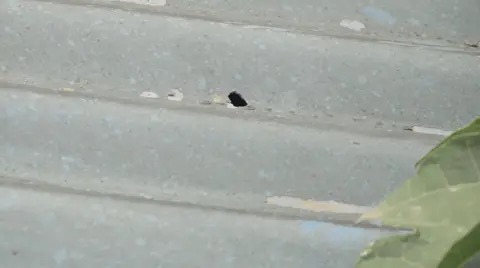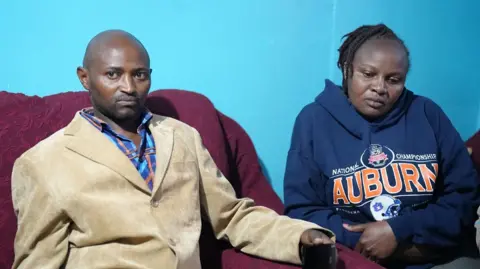Mother mourns 'beautiful' 12-year-old shot while watching TV during Kenya protests
 Njoki's family
Njoki's familyOn Monday, as anti-government protests swept across parts of Kenya, 12-year-old Bridgit Njoki sat watching television in her family's modest home.
She had no idea that the deadly clashes between these protesters and Kenya's armed police would find their way into her living room.
A single bullet pierced the roof, puncturing the ceiling and striking Njoki in the head, her mother, Lucy Ngugi, tells the BBC. Within hours, she was pronounced dead in hospital.
"She was my everything," Ms Ngugi says, while sobbing in her home just outside the capital, Nairobi. "She was all I had."
"Let me be the last mother to weep because of the death of a child. An innocent child. I wish she was even playing outside… but inside the house? Oh Lord, this is painful."
Njoki is one of the youngest victims of the violence that has rocked Kenya over the past month. According to the Kenya National Commission on Human Rights (KNCHR), almost 70 people have died and hundreds were wounded in the three major protests that have taken place since 17 June.
The protests - mainly led by young Kenyans - reflect growing discontent over issues like the cost of living, tax hikes, runaway public debt, and police brutality.
On 7 July, the day Njoki died, the authorities barricaded major roads in preparation for the demonstrations.
Video evidence shows the police firing tear gas, and in some cases, live rounds in residential areas where protesters had regrouped.
"The bullet came over the roof of the house. It penetrated into the ceiling, right where Njoki was seated on a chair," says Njoki's grandmother, Margaret Njeri.
"Immediately, her mother grabbed her and came screaming to my home: 'Mum, my child has been shot!' I couldn't even hold the child."

The family had thought they were far from the violent clashes, given they lived in Ndumberi, a village nearly two kilometres (1.2 miles) from a main road.
"I was sure it was a bullet," says Njoki's mother. "The bang that hit the roof was so loud. Very loud."
The police have dismissed the family's claims, insisting a bullet couldn't travel from the main road to their house. But Njoki's lifeless body told a different story.
A report from the 12-year-old's post-mortem examination says doctors retrieved a bullet from her body, and that her head injury was "consistent with a gunshot".
Njoki had been a Grade 7 student at Benson Njau School in Ting'ang'a, a nearby village. As the family's firstborn, she was a caretaker, helper, and the pride of the household.
"She was always number one in her class," her grandmother says. "So obedient, so specific, so neat.
"Even in the way she spoke. She was just a very good girl. She loved serving in church. She helped her siblings. She cooked for me. She was everything."
Njoki's mother describes her as "a beautiful girl, a charming girl, who had so many dreams".
Her father is crushed, unable to speak. Her siblings are also silent. Grief hangs like a shroud in the house, while Njoki's chair sits empty.
The deaths of dozens like Njoki have drawn international condemnation.
The UN said it was deeply troubled by the killings and criticised the Kenyan police for using "lethal ammunition" against protesters.
This all feels like a repeat of last year, when according to the KNCHR, more than 50 died in a police crackdown on months of anti-government protests.
President Ruto has taken a particularly hard-line stance this time.
In a national address following the 7 July protests, in which 38 people were killed, according to the state-run human rights commission, Ruto said: "Anyone caught burning another person's business or property should be shot in the leg, hospitalised and later taken to court. Don't kill them, but ensure their legs are broken."
Ruto has accused political rivals of inciting violence in a bid to unseat him illegally, but the president's opponents have dismissed this allegation.

Meanwhile, back in Ndumberi, Njoki's family are simply calling for an end to the brutality.
"I'll bury Njoki, but I'll never forget the Saba Saba Day [7 July]. Let Njoki be the last sacrifice of these protests," her mother says.
The ongoing anti-government protest movement has reshaped Kenyan politics. It has demanded transparency, empathy and a listening ear. But it has also paid in blood.
And as the uprising continues, Njoki's name and those of many others lost have become a symbol - of innocence, state overreach, and a lack of accountability.
"Let's not burn our country. Let's have dialogue. Let's talk. We are brothers and sisters, I'm begging our government - let this not happen to any other parent," Njoki's mother says.
"Don't let another child die like Njoki."
You may also be interested in:
 Getty Images/BBC
Getty Images/BBCGo to BBCAfrica.com for more news from the African continent.
Follow us on Twitter @BBCAfrica, on Facebook at BBC Africa or on Instagram at bbcafrica
